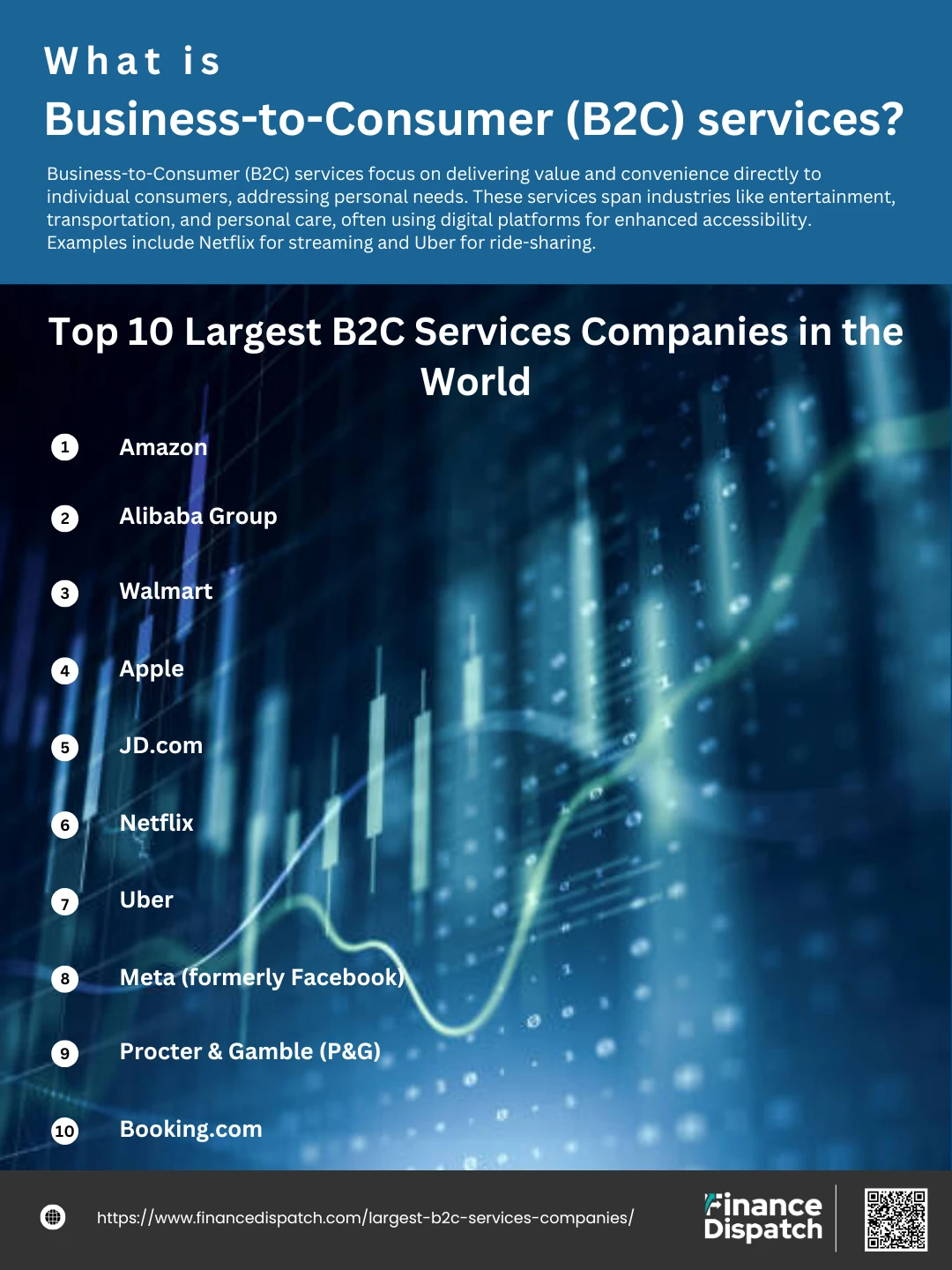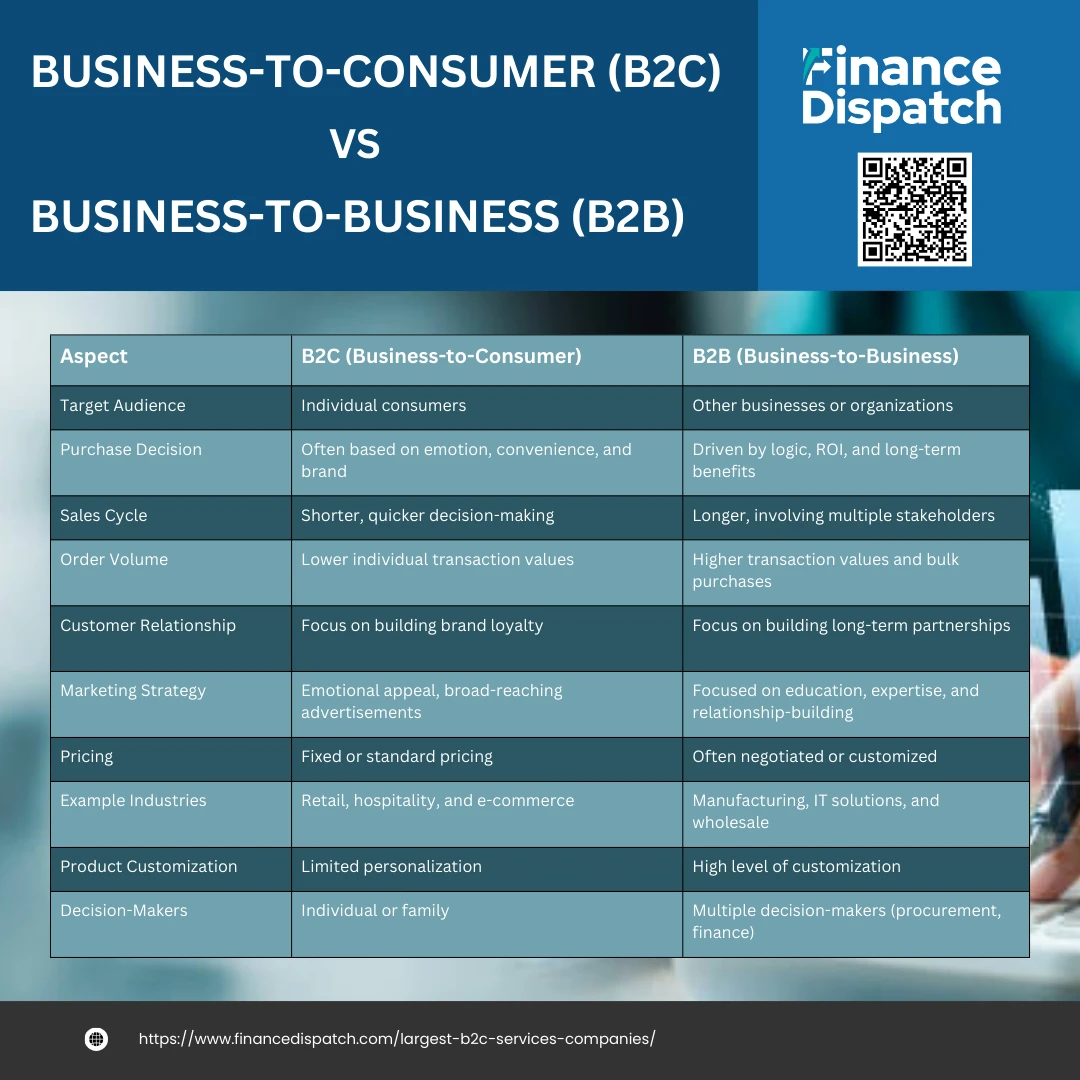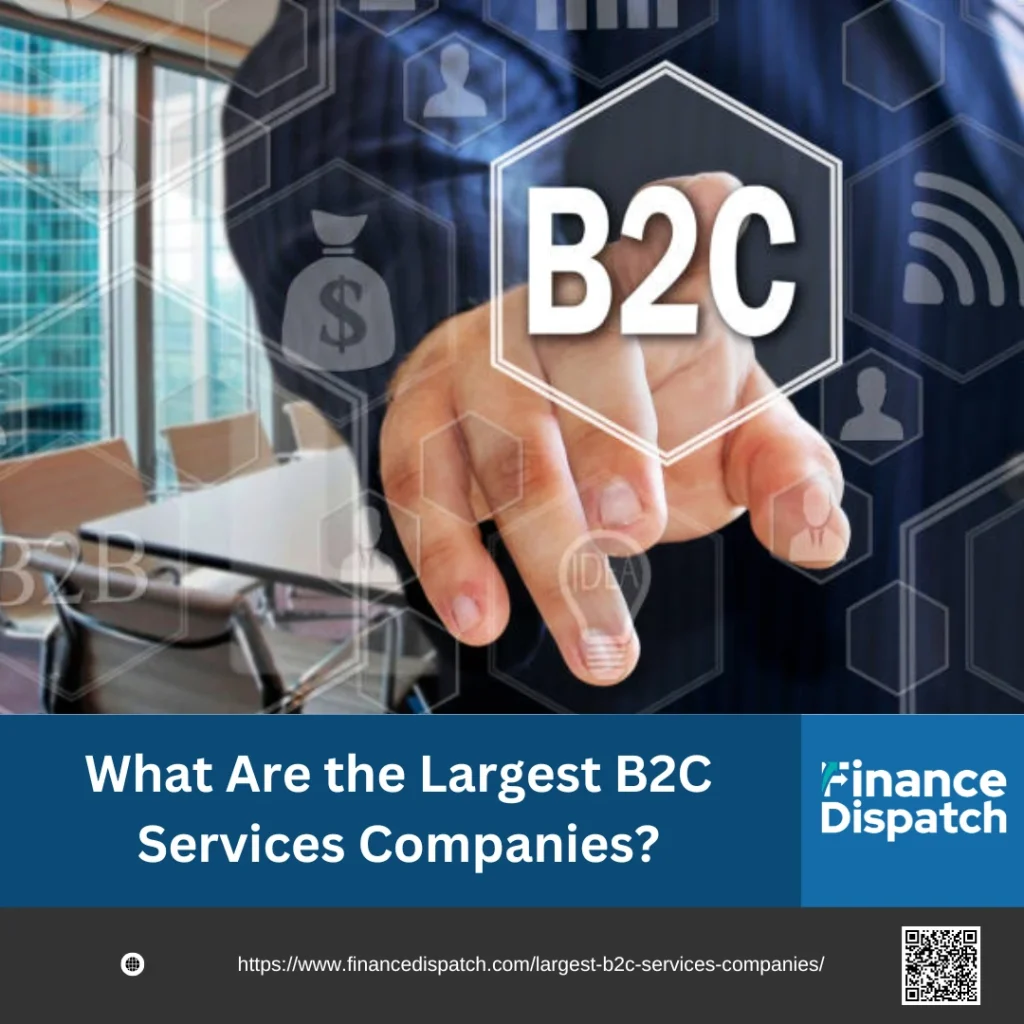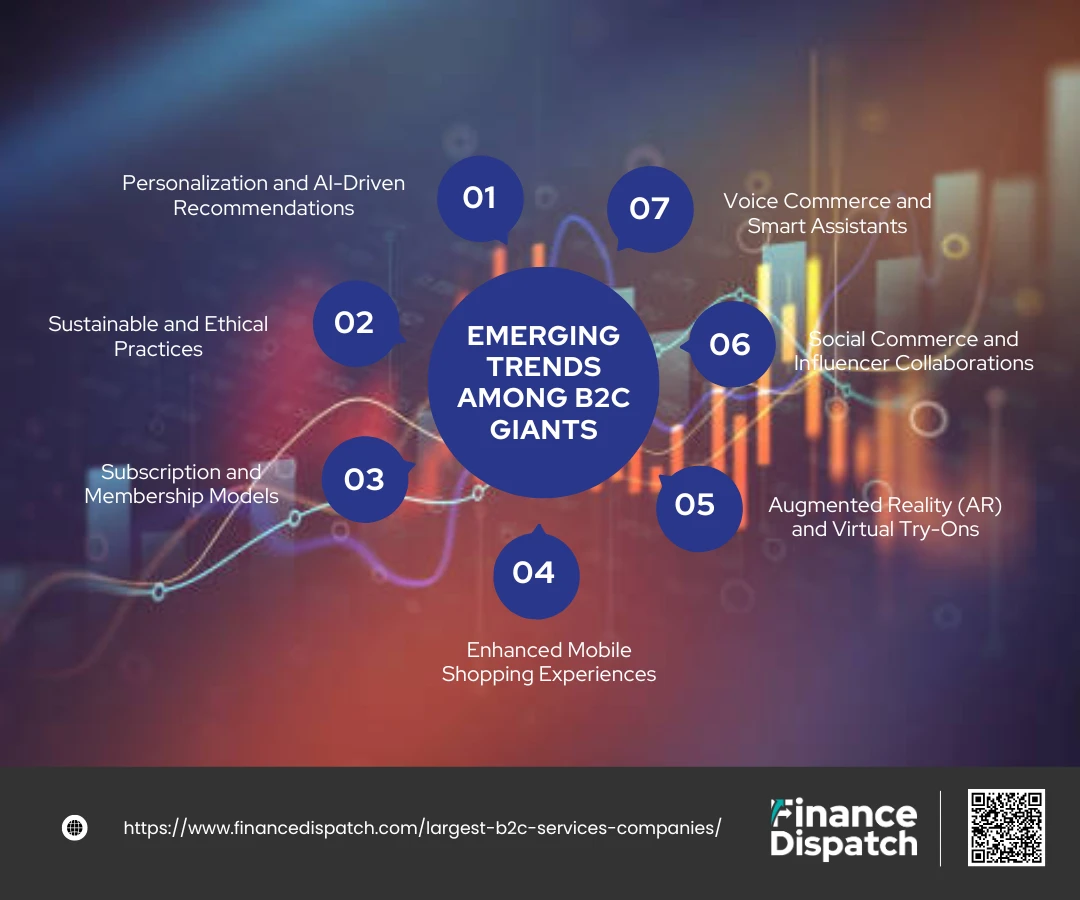Business-to-Consumer (B2C) services involve companies providing services directly to individual consumers, addressing their personal needs and preferences. This model encompasses a wide range of industries, including hospitality, entertainment, personal care, and financial services. For instance, streaming platforms like Netflix offer entertainment services directly to viewers, while ride-sharing companies like Uber provide transportation services to individuals. The primary goal of B2C services is to deliver value and convenience to consumers, often leveraging digital platforms to enhance accessibility and user experience
When exploring the largest B2C (Business-to-Consumer) service companies, you’re diving into a world shaped by digital transformation, consumer demand, and innovative business models. These companies, spanning sectors from e-commerce and digital media to transportation and wellness, have become giants by catering directly to individual consumers’ needs. Leveraging online platforms, mobile apps, and personalized services, B2C companies have reshaped the way people shop, communicate, and manage everyday tasks. In this article, we’ll uncover the leading players in the B2C space, highlighting how they’ve scaled to serve millions and become essential to modern life.

Top 10 Largest B2C Services Companies in the World
The largest B2C services companies in the world have not only succeeded in capturing vast customer bases but have also set the benchmark for innovation, customer service, and market reach. These companies span various industries, from e-commerce and digital streaming to transportation and food delivery, each transforming how consumers interact with everyday services. Here’s a look at the top 10 largest B2C services companies that continue to dominate the global market.
1. Amazon
Amazon is a global leader in e-commerce, providing consumers with an extensive selection of products, from books and electronics to clothing and household items. Through its Prime membership program, Amazon offers expedited shipping, streaming entertainment, and exclusive discounts, creating a highly engaged customer base. Amazon Web Services (AWS) has also made it a major player in cloud computing, contributing significantly to its growth and expanding its influence beyond retail. With its efficient logistics network and customer-first approach, Amazon has become synonymous with online shopping worldwide.
2. Alibaba Group
Alibaba is the leading e-commerce platform in China, connecting millions of small businesses with consumers through its popular online marketplaces, Taobao and Tmall. In addition to e-commerce, Alibaba has diversified into sectors like cloud computing, digital media, and logistics. AliExpress, its international retail platform, has brought affordable Chinese products to global consumers. Alibaba’s ability to leverage data insights and enhance shopping experiences has positioned it as a cornerstone of China’s digital economy and a global e-commerce giant.
3. Walmart
As one of the largest brick-and-mortar retailers, Walmart has successfully integrated digital capabilities to offer a seamless online shopping experience alongside its physical stores. Walmart’s competitive pricing, vast product range, and efficient distribution network have solidified its position as a household name. With Walmart+ and an expanding e-commerce platform, the company competes directly with Amazon, focusing on value and convenience for its loyal customer base.
4. Apple
Apple’s iconic consumer products, such as the iPhone, iPad, and Mac computers, have set standards in technology and design. Beyond hardware, Apple’s ecosystem includes services like iCloud, the App Store, and Apple Music, which enhance user experience and strengthen brand loyalty. Apple’s focus on privacy, premium quality, and innovation has created a highly engaged global customer base, making it one of the most valuable and trusted brands in the consumer technology space.
5. JD.com
JD.com is China’s second-largest e-commerce platform, known for its focus on quality and fast delivery. The company’s advanced logistics network, including warehouses and autonomous delivery vehicles, enables it to provide reliable service across China. JD.com is trusted for offering genuine products directly from manufacturers, appealing to quality-conscious consumers. Its emphasis on technology, particularly AI and robotics, has made JD.com a significant force in China’s retail landscape and an influential player in the Asian market.
6. Netflix
Netflix revolutionized the entertainment industry by shifting from DVD rentals to on-demand streaming, creating a library of original series, films, and documentaries that appeal to diverse audiences worldwide. Netflix’s personalized recommendation system and user-friendly platform have made it a household name, shaping global content consumption habits. Known for its strategic content investments and localized offerings, Netflix continues to dominate the streaming space by providing value to its subscribers across different regions.
7. Uber
Uber transformed urban transportation with its easy-to-use ride-sharing app, providing fast, affordable rides in hundreds of cities globally. Its expansion into food delivery with UberEATS and other on-demand services has diversified its reach, making Uber an essential service for millions. By constantly innovating with features like cashless payments and real-time tracking, Uber has established itself as a leader in the gig economy, appealing to consumers who value convenience and accessibility.
8. Meta (formerly Facebook)
Meta, the parent company of Facebook, Instagram, and WhatsApp, is a powerhouse in social media and online communication, connecting billions of users worldwide. These platforms have reshaped how people interact, share information, and consume media. Meta’s social media channels also offer significant advertising opportunities, allowing businesses to reach targeted audiences based on detailed user data. As a central hub for social engagement and digital marketing, Meta continues to shape the future of online communities and B2C interactions.
9. Procter & Gamble (P&G)
Procter & Gamble is a global leader in consumer goods, with a vast portfolio that includes trusted brands like Tide, Pampers, Gillette, and Crest. P&G’s products span categories such as household care, personal care, and health, making it a staple in homes worldwide. Known for quality and reliability, P&G has built strong customer loyalty through continuous innovation and effective marketing. The company’s emphasis on sustainability and consumer-centricity keeps it relevant in an evolving market.
10. Booking.com
Booking.com has made travel planning accessible and convenient for millions, providing a comprehensive platform to book accommodations, flights, and car rentals. With a focus on user experience, Booking.com offers an extensive range of travel options and transparent customer reviews, empowering travelers to make informed decisions. Its global reach and simplified booking process have established it as a preferred choice for vacationers and business travelers, contributing to its status as one of the world’s leading online travel agencies.

Business-to-Consumer (B2C) vs. Business-to-Business (B2B)
Business-to-Consumer (B2C) and Business-to-Business (B2B) are two distinct models that companies use to target different audiences. While B2C companies sell products or services directly to individual consumers for personal use, B2B companies cater to other businesses, offering solutions that help them operate more effectively. These models differ in terms of customer needs, sales cycles, and marketing approaches, each requiring unique strategies to drive engagement and revenue.
| Aspect | B2C (Business-to-Consumer) | B2B (Business-to-Business) |
| Target Audience | Individual consumers | Other businesses or organizations |
| Purchase Decision | Often based on emotion, convenience, and brand | Driven by logic, ROI, and long-term benefits |
| Sales Cycle | Shorter, quicker decision-making | Longer, involving multiple stakeholders |
| Order Volume | Lower individual transaction values | Higher transaction values and bulk purchases |
| Customer Relationship | Focus on building brand loyalty | Focus on building long-term partnerships |
| Marketing Strategy | Emotional appeal, broad-reaching advertisements | Focused on education, expertise, and relationship-building |
| Pricing | Fixed or standard pricing | Often negotiated or customized |
| Example Industries | Retail, hospitality, and e-commerce | Manufacturing, IT solutions, and wholesale |
| Product Customization | Limited personalization | High level of customization |
| Decision-Makers | Individual or family | Multiple decision-makers (procurement, finance) |
Emerging Trends among B2C Giants
As B2C giants continue to innovate, new trends are reshaping how they connect with consumers, streamline operations, and enhance user experiences. These trends focus on leveraging technology, enhancing personalization, and addressing consumer demands for greater transparency and sustainability. Here are some of the most prominent emerging trends among leading B2C companies:
1. Personalization and AI-Driven Recommendations
B2C companies are using artificial intelligence to provide highly personalized shopping experiences. AI-driven algorithms analyze consumer behavior and preferences to deliver targeted product recommendations, customized ads, and personalized content, creating a more engaging and relevant experience for each user.
2. Sustainable and Ethical Practices
With growing consumer awareness around environmental issues, many B2C giants are prioritizing sustainability and ethical practices. From eco-friendly packaging to carbon-neutral shipping and responsible sourcing, these companies are increasingly adopting initiatives that align with consumers’ values and contribute to a positive brand image.
3. Subscription and Membership Models
Subscription services are becoming increasingly popular among B2C companies, offering consumers convenience, exclusive benefits, and cost savings. Brands like Amazon, Netflix, and Spotify have successfully used this model to build loyalty, while new brands are emerging with subscription services that cater to niche interests.
4. Enhanced Mobile Shopping Experiences
Mobile commerce is on the rise, and B2C giants are optimizing their mobile platforms to provide seamless, user-friendly shopping experiences. This includes mobile-optimized websites, apps with advanced features, and payment solutions that cater to the growing trend of shopping on the go.
5. Augmented Reality (AR) and Virtual Try-Ons
To enhance the online shopping experience, B2C companies are integrating augmented reality features that allow consumers to virtually try on products, such as clothing, makeup, or furniture. This immersive experience helps reduce uncertainty in purchasing decisions and improves overall satisfaction.
6. Social Commerce and Influencer Collaborations
Social media is evolving into a direct sales channel, with platforms like Instagram and TikTok offering in-app shopping features. B2C companies are collaborating with influencers and creating shoppable posts to meet consumers where they spend time online, enabling seamless transitions from inspiration to purchase.
7. Voice Commerce and Smart Assistants
As voice-activated devices become more prevalent, B2C giants are incorporating voice commerce into their strategies. This trend allows consumers to make purchases, check orders, and access product information using voice commands on smart assistants like Amazon’s Alexa or Google Assistant, adding a new level of convenience.
Conclusion
In conclusion, B2C services companies have revolutionized the way people access products and services, shaping modern consumer habits and global economic trends. By leveraging technology, personalization, and streamlined operations, these companies make it easier for consumers to interact with brands, find what they need, and enjoy convenient, tailored experiences. The ongoing growth and innovation in the B2C space have not only transformed industries but have also contributed significantly to job creation, economic development, and international commerce. As consumer expectations continue to evolve, B2C companies are poised to play an even greater role in driving change and setting new standards in customer engagement and digital transformation. Their influence will remain a defining force, continuously pushing the boundaries of what’s possible in the global economy.
FAQs
1. How do B2C companies collect and use customer data?
B2C companies gather data from various sources, including online purchases, browsing behavior, and social media interactions. This data is used to personalize experiences, target marketing efforts, improve customer service, and develop products that better meet consumer needs, all while adhering to data privacy regulations.
2. What role does customer feedback play in B2C businesses?
Customer feedback is crucial in B2C as it provides insights into consumer preferences and areas for improvement. Many companies use feedback to adjust products, refine services, and enhance the overall customer experience. Tools like surveys, reviews, and social media interactions are common ways B2C companies gather feedback.
3. How do B2C companies adapt to rapid changes in consumer trends?
B2C companies stay adaptable by closely monitoring market trends, consumer behavior, and feedback. They often employ agile business models, allowing them to pivot quickly with product offerings, marketing strategies, and digital solutions to stay aligned with evolving consumer demands.
4. What strategies do B2C companies use to maintain customer loyalty?
B2C companies build loyalty through personalized experiences, loyalty programs, exclusive offers, and strong customer service. By creating value and building trust, they encourage repeat purchases and foster a loyal customer base that often serves as brand advocates.
5. How do B2C companies ensure secure online transactions?
Security is a priority for B2C companies, especially in e-commerce. They use encryption, secure payment gateways, two-factor authentication, and compliance with data protection regulations to protect customer information and maintain consumer trust in their online platforms.




